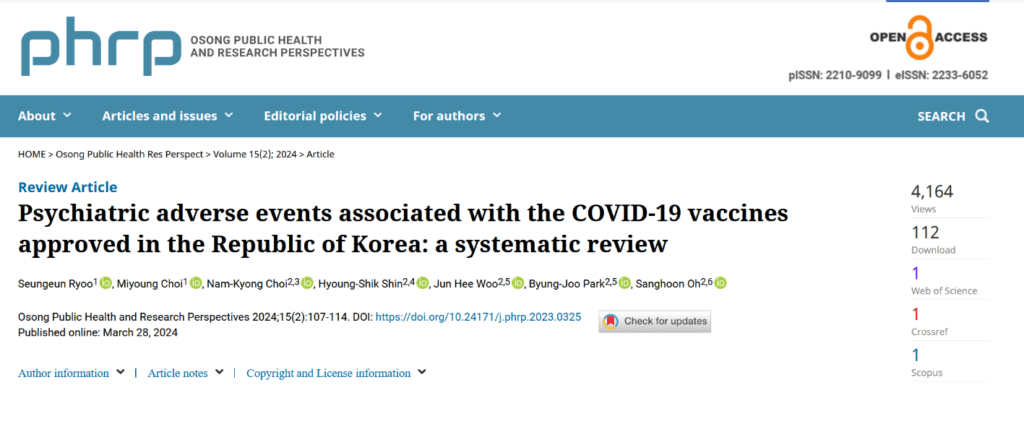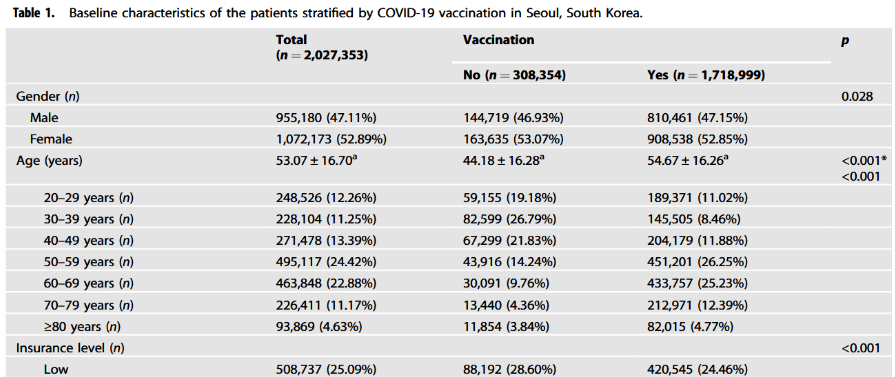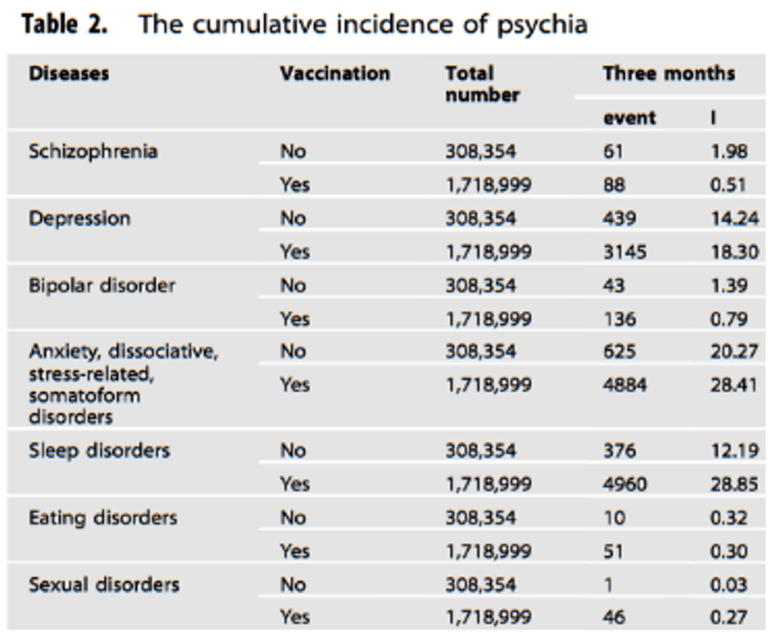Genetic Engineering of the PsycheA South Korean study reveals rising depression, anxiety, and sleep disorders after SARS-CoV-2 mRNA vaccinations, while the apparent drop in schizophrenia and bipolar cases proves misleading.In South Korea, a retrospective analysis investigated the mental and psychological health effects of SARS-CoV-2 mRNA injections. The findings were published in June 2024. [1] A similar study published in South Korea in October 2024 examined the progression of Alzheimer's disease and revealed a dramatic acceleration of this dementing condition shortly after the genetic intervention, as I detailed on my Substack before (see 'Accelerated Development of Alzheimer’s Disease Following mRNA Injections').[2] The results of the new study indicate that after at least two SARS-CoV-2 mRNA injections, depression increased by 60 percent, anxiety disorders, dissociative or multiple personality disorders, stress-related and somatoform or psychosomatic disorders by approximately 44 percent, and sleep disorders by an alarming 93 percent compared to individuals who had not received the genetic modification. Surprisingly, the risk of schizophrenia in this study was reduced by about 77 percent among the genetically modified group, while the risk of bipolar disorder was still reduced by about 33 percent. What may seem remarkable at first glance is easily explained: these apparent improvements can be attributed to the age distribution of the two groups. As shown in Table 1 of the publication mentioned above, the genetically modified individuals (“Vaccination – Yes”) were predominantly in the 50–69 age group, whereas the majority of unmodified individuals (“Vaccination – No”) were in younger age groups. However, since the onset age for schizophrenia and bipolar disorder is typically younger, this age bias in the observation groups makes the occurrence or observation of these two conditions in the genetically modified group highly unlikely. This, of course, is entirely independent of the genetic intervention, as evidenced by the relatively low cumulative cases reported in Table 2 of the publication. During the 3-month observation period, there were only 88 cases of schizophrenia. In contrast, there were 3,145 cases of depression, 4,884 cases of anxiety and other mental disorders, and 4,960 cases of sleep disorders. Even for bipolar disorders, there were only 136 new cases among a population of over 1.7 million people. I’ll make a strong assertion: if these figures were broken down by age group—unfortunately, they were not—this breakdown alone would explain the results. According to a metastudy published in April 2024, which analyzed data from several clinical trials in combination, the findings even suggest the opposite trend. The study directors highlighted “a potential link between young age, mRNA, and viral vector vaccines with new-onset psychosis within 7 days post-vaccination.” [3] If the Korean study had broken down the results by age, this opposite trend might have become evident. Notably, the authors of the new study, from which the misleading conclusions are drawn, also acknowledged this issue themselves:
The study cited by the authors clearly demonstrates that the first occurrence of schizophrenic or manic-depressive illnesses rarely happens after the age of 20, which fundamentally calls the study's findings into question on this point. In any case, the claim of a reduction in cases of schizophrenia and bipolar disorder is, in my view, certainly incorrect due to the significant age bias and the small number of cases. In contrast, sleep disorders, depression, anxiety, and other mental health conditions, for which an increased risk was measured following mRNA injections, are largely independent of age. Consequently, this finding could be more reliable (also supported by the significantly larger number of cases, though still subject to the caveat of age bias). This is particularly relevant given that spike mRNA injections have been shown to cause neuroinflammation [5]. Neuroinflammation is consistently associated with an elevated risk of developing depression [6], sleep disorders [7], and anxiety symptoms [8]. Conclusion: The genetic modification of humans through spike mRNA leads to serious neuropsychiatric disorders and illnesses, most likely caused by neuroinflammation. For further details, see my discussions in the articles 'Lithium, the Essential Trace Element' and 'The Efficacy of Lithium in the Treatment of Spikeopathy.' Sources[1] Kim HJ et al: Psychiatric adverse events following COVID-19 vaccination: a population-based cohort study in Seoul, South Korea. Mol Psychiatry 29, 3635–3643 (2024). https://doi.org/10.1038/s41380-024-02627-0 [2] Roh JH et al: A potential association between COVID-19 vaccination and development of Alzheimer’s disease. QJM. 2024 Oct 1;117(10):709-716. doi: 10.1093/qjmed/hcae103. PMID: 38806183. [3] Lazareva M et al: New-onset psychosis following COVID-19 vaccination: a systematic review. Front Psychiatry. 2024 Apr 12;15:1360338. doi: 10.3389/fpsyt.2024.1360338. PMID: 38680784; PMCID: PMC11046000. [4] Ortiz-Orendain J et al: Antecedents to first episode psychosis and mania: Comparing the initial prodromes of schizophrenia and bipolar disorder in a retrospective population cohort. J Affect Disord. 2023 Nov 1;340:25-32. doi: 10.1016/j.jad.2023.07.106. Epub 2023 Jul 27. PMID: 37506772; PMCID: PMC10883376. [5] Frank MG et al: SARS-CoV-2 spike S1 subunit induces neuroinflammatory, microglial and behavioral sickness responses: Evidence of PAMP-like properties. Brain Behav Immun. 2022 Feb;100:267-277. doi: 10.1016/j.bbi.2021.12.007. Epub 2021 Dec 13. PMID: 34915155; PMCID: PMC8667429. [6] Troubat R et al: Neuroinflammation and depression: A review. Eur J Neurosci. 2021 Jan;53(1):151-171. doi: 10.1111/ejn.14720. Epub 2020 Mar 20. PMID: 32150310. [7] Zielinski MR, Gibbons AJ. Neuroinflammation, Sleep, and Circadian Rhythms. Front Cell Infect Microbiol. 2022 Mar 22;12:853096. doi: 10.3389/fcimb.2022.853096. PMID: 35392608; PMCID: PMC8981587. [8] Rossi S et al: Neuroinflammation drives anxiety and depression in relapsing-remitting multiple sclerosis. Neurology. 2017 Sep 26;89(13):1338-1347. doi: 10.1212/WNL.0000000000004411. Epub 2017 Aug 25. PMID: 28842450. |
Worden we wakker? Informeer je! Deel deze informatie over "De Oorlog tegen de Mensheid" + 10.507 posts
vrijdag 24 januari 2025
Genetic Engineering of the Psyche
Het einde van groene energie – Fossiele brandstoffen zijn nog steeds koning
januari 13, 2026 30 Foto Credit: https://depositphotos.com/nl N og niet zo lang geleden waren alle weldenkende liberalen ervan o...





